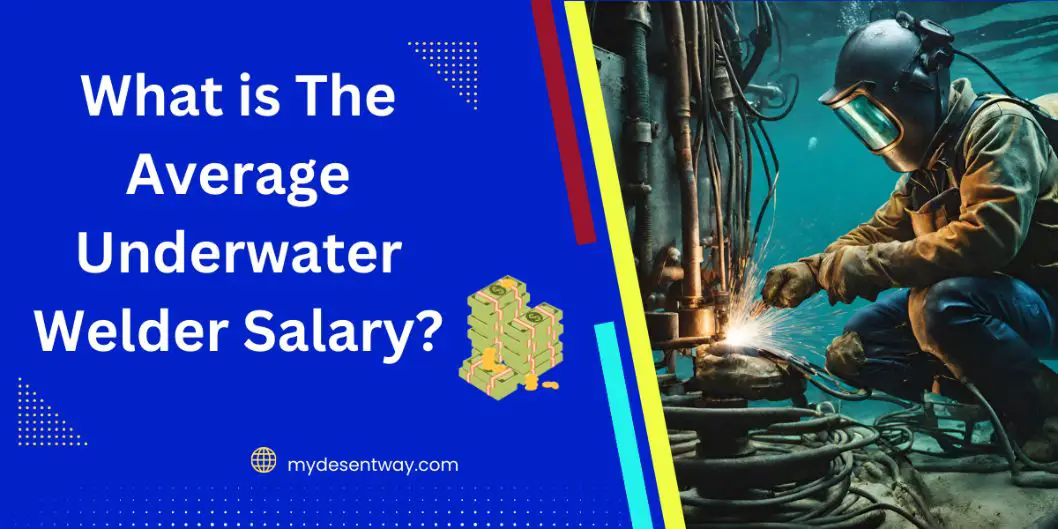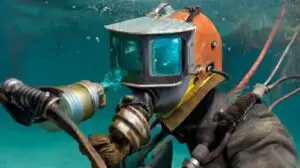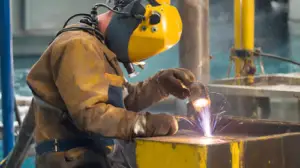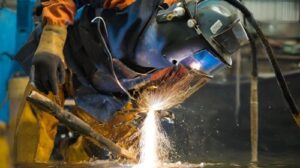Table of Contents
- 1. What is the average underwater welder salary?
- 2. Scope of Underwater Welding Careers
- 3. Income Determinants in Underwater Welding
- 4. Comparative Analysis
- 5. Future and Growth Projections
- 6. Challenges, Rewards, and Risks
- 7. Enhancing Salary Potential
- 8. Real-life Insights
- Conclusion
- FAQs about Underwater Welder Salary?
Dive into the depths of the underwater welding profession and uncover its lucrative potential. From high-paying opportunities to the factors influencing salaries, this article unveils the secrets behind underwater welder earnings, guiding you through a compelling exploration of this dynamic and rewarding career path.
1. What is the average underwater welder salary?
The underwater welder salary varies widely based on factors like experience, location, and job specifics. However, on average:
The hourly rate for an underwater welder varies widely, often ranging between $25 to $80 per hour, based on experience, location, and the specific project’s complexity.
On a monthly basis, an underwater welder working full-time might earn between $4,000 to $12,000, depending on factors like job availability, overtime, and skill level.
Annually, an underwater welder’s salary can range from $50,000 to $150,000 on average, though exceptional professionals or those in high-demand locations might earn over $300,000. These figures are influenced by experience, certifications, and the complexity of projects undertaken.
Factors Impacting Salary Variances
Experience and Expertise: Experienced welders with a track record of successful projects and a deep understanding of welding techniques in challenging conditions tend to earn higher incomes. Employers often reward experience due to its correlation with efficiency, safety, and high-quality work.
Location and Industry Demand: Geographical location significantly influences salary variations. Coastal areas with heavy maritime industries or offshore oil rigs often offer higher salaries due to the demand for underwater welding services. Moreover, regions with limited skilled underwater welders may offer increased compensation to attract talent.
Certifications and Specializations: Certifications from recognized diving and welding institutions contribute to higher earnings. Specialized certifications in advanced techniques or specific industries, such as nuclear welding or pipeline welding, can elevate an underwater welder’s market value and, subsequently, their salary.
2. Scope of Underwater Welding Careers
Offshore vs. Onshore Diving Work
-
Offshore Diving Career
Offshore diving involves working on oil rigs, underwater construction sites, or in the maritime industry. The demand for underwater welders in offshore environments is often higher due to the maintenance needs of oil platforms, pipelines, and other submerged structures. Salaries in this sector are typically higher due to the challenging nature of the work and the associated risks.
-
Onshore (Inland/Coastal) Diving Career
Inland or coastal diving, while different from offshore work, presents its own set of challenges and opportunities. This involves working on bridges, dams, ports, and other structures located closer to shorelines. While the pay might vary compared to offshore work, onshore diving can offer more predictable schedules and relatively safer working conditions.
-
Country-Based Salary Variations
The geographical location plays a significant role in determining an underwater welder’s salary. Countries with robust maritime industries or extensive offshore activities tend to offer higher salaries. For instance:
- Norway, the United States, Australia, and Canada: These countries often have well-established underwater welding industries with higher average salaries due to their substantial maritime operations.
- United Kingdom, Netherlands: With their strong maritime traditions, these countries also offer lucrative opportunities for underwater welders.
- United Arab Emirates, Saudi Arabia, Qatar, and Singapore: Emerging markets in the maritime sector may offer competitive salaries along with unique cultural experiences for underwater welders.
| Country | Salary Range (Approximate Annual) |
| Norway | $90,000 – $150,000 |
| United States | $50,000 – $300,000+ |
| Australia | $70,000 – $150,000+ |
| Canada | $60,000 – $120,000+ |
| United Kingdom | £40,000 – £80,000+ |
| Netherlands | €40,000 – €80,000+ |
| United Arab Emirates | AED 120,000 – AED 300,000+ |
| Saudi Arabia | SAR 120,000 – SAR 250,000+ |
| Qatar | QAR 120,000 – QAR 300,000+ |
| Singapore | SGD 50,000 – SGD 120,000+ |
Please note that these salary ranges are approximate and can vary based on factors like experience, certifications, specific job roles, and the demand for underwater welding services within each country.
3. Income Determinants in Underwater Welding
Influence of Field Experience & Certifications
-
Commercial Diver Field Experience Above All Else
Field experience holds immense weight in determining an underwater welder’s earning potential. The ability to navigate challenging underwater conditions, manage complex welding tasks, and adhere to stringent safety protocols comes with hands-on experience. Seasoned underwater welders with a history of successful projects often command higher salaries due to their demonstrated expertise and reliability.
-
The Power of Certification
Certifications serve as a testament to an underwater welder’s competence and proficiency. Acquiring certifications from reputable diving and welding institutions not only enhances one’s skills but also contributes significantly to salary increments. Advanced certifications in specialized techniques or industries—such as hyperbaric welding or underwater non-destructive testing—open doors to higher-paying opportunities.
Diverse Working Environments
-
Influence of Diving Environments
The environments in which underwater welders operate significantly impact their earning potential. Working in harsh conditions, such as deep-sea welding or in areas with strong currents, tight spaces, or low visibility, often commands higher compensation due to the added challenges and risks involved. Specializing in these demanding environments can lead to increased income opportunities.
-
Depth of Work: How Much Money Does a Saturation Diver Make?
Saturation diving, involving work at considerable depths for extended periods, presents unique challenges and hence offers higher pay scales. Saturation divers, equipped to withstand extreme pressure and work at greater depths, often earn significantly more than their counterparts involved in shallower dives.
4. Comparative Analysis
Topside vs. Underwater Welding Pay Scales
-
High-Paying Cities & States
Comparing topside (above-water) welding with underwater welding unveils distinct salary differentials. While both are welding professions, underwater welding often commands higher pay due to its specialized nature and the inherent risks associated with working in submerged environments.
Topsiders, working in conventional welding roles, might find lucrative opportunities in metropolitan areas with a high demand for welding services. However, when contrasting these positions with underwater welders, the latter generally earn more due to the unique skills required and the challenging work conditions they face.
-
Regional Salary Disparities
Certain cities or states stand out as top-paying hubs for both topside and underwater welding roles. For topside welding, metropolitan regions with extensive industrial operations or significant construction projects tend to offer higher salaries. However, the income differential between topside and underwater welding becomes more pronounced in regions with active maritime industries or offshore operations.
5. Future and Growth Projections
Prospects in Commercial Diving
-
Emerging Sectors and Trends
The future of underwater welding and commercial diving appears promising, driven by various factors. Advancements in offshore energy exploration, underwater infrastructure development, and maintenance needs in sectors like renewable energy and underwater construction are fueling the demand for skilled underwater welders.
-
Technological Advancements
Innovation plays a crucial role in shaping the future of underwater welding. Advancements in welding techniques, equipment, and safety protocols are enhancing efficiency and safety, creating a demand for welders adept at utilizing cutting-edge technology.
-
Emerging Sectors and Job Trends
Several emerging sectors, including underwater robotics, marine research, and offshore renewable energy, are anticipated to offer lucrative opportunities for underwater welders. These sectors are expected to expand, creating a demand for skilled professionals capable of handling specialized underwater welding tasks.
6. Challenges, Rewards, and Risks
Fulfillment in the Profession
-
Unique Experiences
Underwater welding offers unparalleled experiences, allowing individuals to work in diverse environments and witness marine life up close. The satisfaction of contributing to crucial infrastructure projects, repairing underwater structures, and overcoming challenging tasks can be immensely fulfilling for those passionate about the profession.
-
Risks Involved
However, it’s essential to acknowledge the risks associated with underwater welding. Working in underwater environments involves inherent dangers, including decompression sickness, high-pressure environments, limited visibility, and the potential for equipment malfunctions. Safety protocols and extensive training are crucial to mitigate these risks.
Challenges and Rewards
-
Physical Demands and Work Conditions
The physical demands of underwater welding cannot be understated. Enduring long hours in water, managing equipment in challenging conditions, and facing unpredictable situations require robust physical and mental stamina. Yet, successfully overcoming these challenges brings immense satisfaction.
-
Rewards Beyond Monetary Compensation
While the monetary rewards in underwater welding can be significant, the profession also offers non-monetary rewards. The sense of accomplishment from completing complex projects, the opportunity to travel to diverse locations, and the camaraderie among underwater welding teams contribute to a rewarding career experience.
7. Enhancing Salary Potential
Strategies for Income Increment
-
Continuing Education and Specializations
Continuous learning is pivotal in the underwater welding profession. Pursuing advanced courses, certifications in specialized techniques, or acquiring additional skills beyond welding can significantly enhance an individual’s marketability and earning potential.
-
Networking and Diversifying Skills
Building a professional network within the industry is invaluable. Networking with experienced professionals, diving companies, and industry experts can open doors to high-paying opportunities. Moreover, diversifying skill sets by gaining expertise in related fields such as underwater inspection or project management can augment earning potential.
Real-life Insights and Testimonials
-
Interviews or Stories from Experienced Underwater Welders
Gaining insights from seasoned underwater welders through interviews or testimonials can provide aspiring welders with invaluable advice and practical tips. Learning from their experiences, challenges, and strategies for career advancement can guide individuals on the path to enhancing their salary potential.
8. Real-life Insights
Personal Stories and Interviews
-
Experienced Underwater Welders’ Testimonials
Gaining firsthand insights from experienced underwater welders offers valuable perspectives on the profession. These testimonials provide aspiring welders with a glimpse into the daily life, challenges, and rewards of working in underwater welding.
-
Career Journeys and Lessons Learned
Exploring the career journeys of seasoned professionals sheds light on the diverse paths individuals take within the underwater welding field. Hearing about their challenges, achievements, and the strategies they employed to progress in their careers serves as a source of inspiration and guidance for newcomers.
Interviews or Stories from Industry Experts
Apart from welders themselves, interviews with industry experts—diving supervisors, welding inspectors, or professionals in related fields—provide a broader understanding of the underwater welding industry. Their insights into industry trends, skill demands, and future prospects offer a comprehensive view of the profession.
Conclusion
In conclusion, the underwater welder salary spectrum reflects the dynamic nature of this profession. From hourly rates averaging between $25 to $80, monthly earnings varying from $4,000 to $12,000+, to yearly incomes averaging $50,000 to $150,000+, the range is vast.
However, exceptional professionals can surpass $300,000 annually. These figures fluctuate based on experience, location, and specialized skills. Underwater welding stands as a field offering not just financial rewards but also challenges, fulfillment, and the opportunity to explore the depths of marine infrastructure
FAQs about Underwater Welder Salary?
What is the average salary of an underwater welder?
The average salary for an underwater welder ranges between $50,000 to $150,000 annually, varying based on experience, location, and certifications.
Do underwater welders earn more than topside welders?
Generally, yes. Underwater welders often earn more due to the specialized skills required, the challenging work environment, and the risks associated with working in submerged conditions.
How does experience affect underwater welder salaries?
Experience plays a significant role. Seasoned underwater welders with extensive experience and successful projects often command higher salaries compared to entry-level welders.
Which countries offer the highest salaries for underwater welders?
Countries with thriving maritime industries like Norway, the United States, Australia, and the United Arab Emirates often offer higher salaries for underwater welders due to the demand for their specialized skills.
What certifications impact underwater welder salaries?
Certifications from reputable diving and welding institutions significantly impact salaries. Advanced certifications in specialized techniques or industries can elevate an underwater welder’s market value and lead to higher pay.



